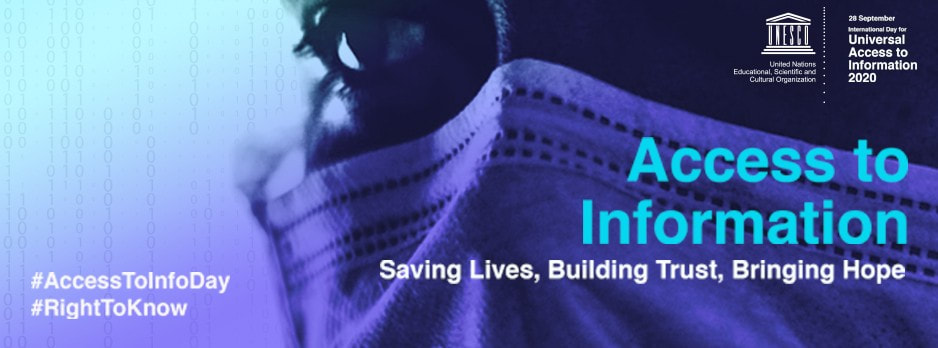Why?
Informed citizens can make informed decisions, for instance, when going to the polls. Only when citizens know how they are governed, can they hold their governments accountable for their decisions and actions. Information is power. Therefore, universal access to information is a cornerstone of healthy and inclusive knowledge societies.
Universal access to information means that everyone has the right to seek, receive and impart information. This right is an integral part of the right to freedom of expression. The media plays a crucial role in informing the public about issues of interest, but it relies on the ability to seek and receive information. So, the right to universal access to information is also bound up with the right to freedom of the press.
In order to raise awareness of the importance of universal access to information, the UN General Assembly has proclaimed 28 September as the International Day for Universal Access to Information.
International days are occasions to educate the public on issues of concern, to mobilize political will and resources to address global problems, and to celebrate and reinforce achievements of humanity. More information available here.
(Source)
IDUAI 2020 will be focusing on to the right to information in times of crisis and on the advantages of having constitutional, statutory and/or policy guarantees for public access to information to save lives, build trust and help the formulation of sustainable policies through and beyond the COVID-19 crisis.
To launch the 2020 International Day for Universal Access to Information and its themes, UNESCO will organize a high-level online panel, “Access of Information – Saving lives, Building Trust, Bringing Hope!,” set to take place online at 2:00 p.m. (CEST) on 28 September. The online panel includes statements from the UNESCO representative and by representatives of the Liberian and Uzbek governments followed by an Open Talks session.
More information available here.
IFLA outlines the role of libraries in this initiative saying:
Libraries have often been at the forefront of efforts to promote access to government information.
Parliamentary libraries for example have a key role in supporting scrutiny, and increasingly in informing the public about how decision are made and delivered. Law libraries preserve and give access to works, while public libraries can be spaces not only to access, but also to gain the skills and support needed to make use of information. See the IFLA article on libraries, access to information and democracy for more. Of course, access to information does not only concern government information.
(Source)
Check out this local initiative
Auckland Libraries is delivering a 'Your vote counts' programme from Monday 21st September to Election Day on Saturday 17th October, 2020. It is focused on supporting communities to participate in the 2020 General Election, particularly those that experience barriers to doing so in a neutral and informative way. They aim to help customers participate and to research their decision, not to tell anyone who to vote for. They say, 'We want to empower our community to take part and hope that through doing so they feel a sense of connectedness and belonging to wider society.' The programme started at Central City Library but is now extended across the network, and has three components.
Library as information hub
Each library will be a location that can support people to enrol to vote, update their details, and navigate any challenges. There is a clear, concise desk guide that has been created for staff to follow.
Book a Librarian sessions (designed to be delivered via phone, Zoom, Skype, or in person)
For people with learning or literacy struggles that may be preventing them from participating. These sessions are also for a general audience to answer any specific questions, research any topics, and help people to make an informed voting decision.
Online Workshops
A series of digital workshops will introduce attendees to the New Zealand system of government, the voting process, and the referendum questions being asked this year. These workshops are being delivered in multiple languages and with different worldviews/experiences in mind (e.g. Te Ao Māori, sessions for the Rough Sleeping community, Auckland’s Persian community, Pasifika peoples, new migrants, refugee groups).



 RSS Feed
RSS Feed